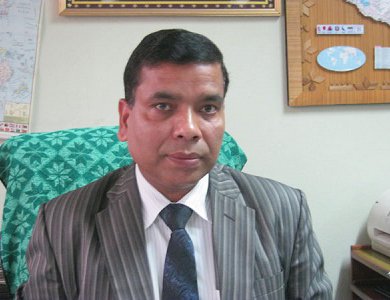
At a time when so much negative news reporting is going on against the NGOs and INGOs, Member Secretary of Social Welfare Council Rabindra Kumar has made efforts to streamline the INGOs and NGOs working in different parts of Nepal. Kumar spoke to New SPOTLIGHT on various issues. Excerpts:
INGOs and NGOs are always criticized for their role. Are they doing really nothing?
Media term for the INGOs is dollar farming. They portray them negatively. However, this is not the reality, as INGOs and NGOs have been making a lot of difference in the rural parts of Nepal, providing the poor and marginalized people with basic services like health, drinking water, sanitation, energy, disaster training, agriculture, environment, education, and livelihood programs.
How do you say that?
For instance, INGOs are actively supporting local NGOs to carry out works to benefit the poor and marginalized population even in the remote areas like Humla, Mustang and Jumla. Because of the INGOs and NGOs, the rural agriculture sector has changed. They help the locals to produce vegetables. They support in building the rope way, micro hydro, health post and so on. Along with this, they also actively work to generate awareness and support campaign against social evils. They have been doing something for the people of Nepal. We cannot ignore this.
Don’t you think anything is wrong in the functioning of INGOs and NGOs?
Some INGOs and NGOs may have done wrongs, but we cannot generalize from this. We need to accept the fact that NGOs and INGOs help farmers to grow off-session vegetables, which is ultimately contributing to improve the livelihood. We can see a clinic run by an INGO in upper Mustang. Similarly, they are supporting basic livelihood program in remote far western Nepal. It is a fact that where there is no presence of government, INGOs and NGOs are delivering the services. Health, education and other sectors are where INGOs have been doing a good job.
Then, why are they criticized?
There is no medicine for those who write and speak biased views. Nobody actually does any homework before making any criticism. I don’t agree that all these organisations are bad for the country. People criticize only when they see there is something going on. Overwhelming numbers of INGOs and NGOs are working perfectly well. The Social Welfare Council is closely monitoring their work and taking legal action against those which do not work in the right direction. If somebody doesn’t work, there is no merit and demerit. Since social organizations have been doing something, people have been commenting on demerits. What I can say is all the 178 INGOs and NGOs registered with us are doing their best. Out of 38,000 NGOs registered with us, only 15-20 percent are active.
How do you see the role of INGOs and NGOs?
We have to accept the fact that the role of INGOs and NGOs is very important in generating awareness. Thanks to the programs launched by them, people living in the rural parts of the country know their rights and responsibilities. They also enlighten Nepalese citizens about the role of the state. Whether it is education or health, NGOs and INGOs have been supporting Nepal government in these sectors. They are also actively supporting the program against HIV/AIDS, girl trafficking and abuse of children and so on.
How do you say that they are doing well?
Those INGOs registered with us have been regularly providing progress report, budget and other program. We have all their progress reports, audit reports and updates about their activities. They annually submit these documents to us. INGOs registered with us are transparent in their dealings.
Despite all these contributions, why is there so much criticism about INGOs and NGOs? Not only media, even the government does not recognize the work done by INGOs. How do you look at this?
Practical Action helped to construct the gravity rope ways in various parts of Nepal. We can visibly see this when we travel to Narayanghad. Similarly, WaterAid has been supporting work to increase access of local people in sanitation. Similar is the case with World Vision and Save the Children. In development sectors, INGOs and NGOs have been supporting government’s policies by implementing various programs.
Why does the government fail to internalize the programs launched by INGOs?
In many cases, the government has been internalizing the successful programs launched by INGOs. In health, sanitation, disaster, education, gender violence and trafficking, you can see this. As we don’t have any indicators to show this, it is very difficult to be precise about it.
On what basis are you saying that INGOs have been doing a good job?
It is a matter of fact. Everyone can perceive the change brought by INGOS and NGOs. It is difficult to exactly say what they have done so far. For instance, INGOs or NGOs have been working in Nepal for the last 40 years to improve livelihoods. We don’t have any parameters or indicators to justify it. For instance, in advocacy sector, INGOs and NGOs have made a great contribution, but we cannot exactly about the success level of parameters in advocacy and awareness generation. We don’t have any measurements to defend it.
What do you see is lacking here?
This is because INGOs and NGOs work through several doors. According to the existing laws, the Social Welfare Council is the only legal entity to allow social organizations to work. However, the situation is different. As per the provisions of Local Governance Act, some NGOs and INGOs have been implementing programs in districts and villages. Of course, INGOs and NGOs need the approval of DDCs to implement the programs, but they cannot go without permission of SWC. Various ministries are also signing memorandum of understanding with INGOs and NGOs. All these are making the situation more complicated. The existing law clearly says that Social Welfare Council is the only regulatory authority to regulate the International and National NGOs working in Nepal. No one can spend any amount of money without clearance of SWC. However, everyone is defying the SWC act.
How do you suggest putting to rest the present controversy surrounding INGOs and NGOs?
As long as we develop and implement the one-door policy, this kind of controversy will continue to appear. Nobody will come to defend the organizations which have been working for the interest of the country. SWC is responsible to regulate the expenditure in social sector. There is a mandatory legal provision which says that there is the need to get the permission from the SWC. It is unfortunate that we are unable to do so.
Can SWC defend the INGOs?
I don’t have any hesitation to defend the 178 INGOs registered with us. I am ready to defend their performance because they present their reports, programs and budget to us. However, there are INGOs working in Nepal without our permission. In some cases, even SWC does not know about them. We need to bring all the INGOs and NGOs under our umbrella. There are several acts related to NGOs and INGOs. Thus, it is very difficult to regulate the social organizations. There is the need to have an umbrella act to govern INGOs. As long as the government does not effectively implement one door policy, the present challenges related to INGOs and NGOs are not going to be solved.
As INGOs and NGOs have been implementing several programs, how do the government agencies internalize them? How do you look at this?
It is very difficult to say how. We need to set the priority of the government. INGOs and NGOs are just complementing the government’s priority projects. They are not parallel to the government. The role of INGOs and NGOs is to support the government’s priority. National Planning Commission has broader guidelines for us. However, there is no fixed priority of the government. It is the government which needs to disclose the priority areas. The role of NGOs and INGOs are to support the government program and complement and supplement them. The government needs to bring clear-cut programs and priorities. We need the government priorities. SWC cannot do it alone.
What steps has SWC been taking to improve coordination?
Realizing the weakness in coordination, we recently held a workshop to increase the coordination among the government agencies and SWC. Even INGOs and NGOs have been facing different problems due to lack of coordination among us.
What is the policy towards INGOs and NGOs?
SWC has its own clear policy regarding INGOs and NGOs. We approve their programs only if they support the government’s priorities. Similarly, we do not endorse programs without the approval of the concerned District Development Committees. In this way, SWC has now been encouraging all development works to meet the government’s priorities. We issue the approval only after DDC’s recommendation. It is the sole duty of DDCs now to say what are the status of different development and other programs implemented by INGOs and NGOs? We need to have mechanism to check the output. We cannot say exactly what the contribution made by INGOs is. Other weakness is that we don’t have any database. Without one door policy, we cannot make desirable changes. Annually, INGOs and NGOs have been spending about 17 billion rupees in various programs. There are possibilities of repetition and duplication of the programs because of lack of coordination.
How powerful is the SWC?
In legal terms, the Social Welfare Council is all powerful. It is not so in reality. SWC cannot approve the projects without recommendation of DDCs. My opinion is that all these must be reflected in the red book. If NGOs and INGOs have been supporting Nepal’s priority projects, that must be included in the red book.
What is your personal impression about NGOs?
If the recent trend is any indication, NGOs are spending much higher budgets than INGOs working in Nepal. All think that INGOs are not working properly, but they ignore the NGOs. Along with INGOs, SWC also needs to focus on NGOs. Large amount of money has been now allocated through NGOs. However, the NGOs are now guided by the act promulgated in 1977.
Can you deregulate INGOs and NGOs in case of their failure to abide by the government rules and policy?
Our act does not say anything about what action needs to be taken in case of failure of NGOs and INGOs to work as required. We don’t have the authority to cancel the registration of NGOs and INGOs. SWC can only recommend dissolution of NGOs. We have to make standby orders for NGOs and INGOs
- MELAMCHI WATER SUPPLY: No Interruption During Monsoon
- Jun 25, 2025
- KOREAN RETURNEES: Successful Integration
- Jun 25, 2025
- UPPER TRISHULI-1: Engaging With Local
- Jun 25, 2025
- IME GROUP: Twenty Five Years Of Journey
- Jun 24, 2025
- NEPAL’S AIR POLLUTION: A Growing Health Concern
- Jun 24, 2025















